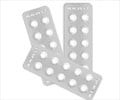Eating more salt causes high blood pressure is well known, however a new study reports that even inhaling salt can cause it.
Eating more salt causes high blood pressure is well known, however a new study reports that even inhaling salt can cause it.
A study published today in the Open Access journal Environmental Health for the first time has shown that breathing in large quantities of salt particles can have just the same effect on blood pressure as eating a salty diet. This can be an occupational health hazard for workers in salt factory. It is recommended that they wearing face masks and plastic eyeglasses to protect workers themselvesResearchers Kripa Haldiya and colleagues from the Desert Medicine Research Centre in Jodhpur, India, provides valuable new data that suggests this finding on hypertension.
"This is a new observation, though it is in line with the hypothesis that, after being inhaled, salt may be absorbed from respiratory tract or the gastrointestinal tract. Consequent increases in plasma sodium may be responsible for increases in the blood pressure", explain Kripa Haldiya.
It is known that high consumption of salt can make a person prone to develop high blood pressure and the consequent development of heart and kidney diseases, which are major causes of mortality worldwide.
Kripa Haldiya et al. measured the blood pressure of workers in two salt milling factories in Rajasthan, India. They looked at two groups of workers. One group worked close to the salt milling plant and was directly involved in crushing, grinding, milling and packing salt; the other group worked far away from the salt milling plant and was much less exposed to salt particles.
The results of the study showed that the first group of workers had a mean systolic blood pressure of 122.1 mmHg, and this was significantly higher than the mean systolic blood pressure of 118.8 mmHg measured in the second group. In addition, workers from the first group had an incidence of hypertension of 12.2%, compared with an incidence of 7.0% in the second group.
Advertisement
This press release is based on the article:
Advertisement
This article is available free of charge, according to Environmental Health's Open Access policy at:
http://www.ehjournal.net/
Further information on Hypertension from Medindia:
Stroke: Hypertension is the most important risk factor for stroke. Very high pressure can cause a break in a weakened blood vessel, which then bleeds in the brain. This can cause a stroke. If a blood clot blocks one of the narrowed arteries, it can also cause a stroke.
Impaired Vision: High blood pressure can eventually cause blood vessels in the eye to burst or bleed. Vision may become blurred or otherwise impaired and can result in blindness.
Arteries: As people get older, arteries in the body "harden," especially those in the heart, brain, and kidneys. This, in turn, causes the heart and kidneys to work harder.
Kidney Damage: The kidneys act as filters to rid the body of wastes. Over time, high blood pressure can narrow and thicken the blood vessels of the kidneys. The kidneys filter less fluid, and waste builds up in the blood. The kidneys may fail altogether.
Heart Attack: High blood pressure is a major risk factor for heart attack. The arteries bring oxygen-carrying blood to the heart muscle. If the heart cannot get enough oxygen, chest pain, also known as "angina," can occur. If the flow of blood is blocked, a heart attack results.
Congestive Heart Failure: High blood pressure is the number one risk factor for congestive heart failure (CHF). CHF is a serious condition in which the heart is unable to pump enough blood to supply the body's needs.
https://www.medindia.net/patients/
patientinfo/highbloodpressure_learnmore.htm











